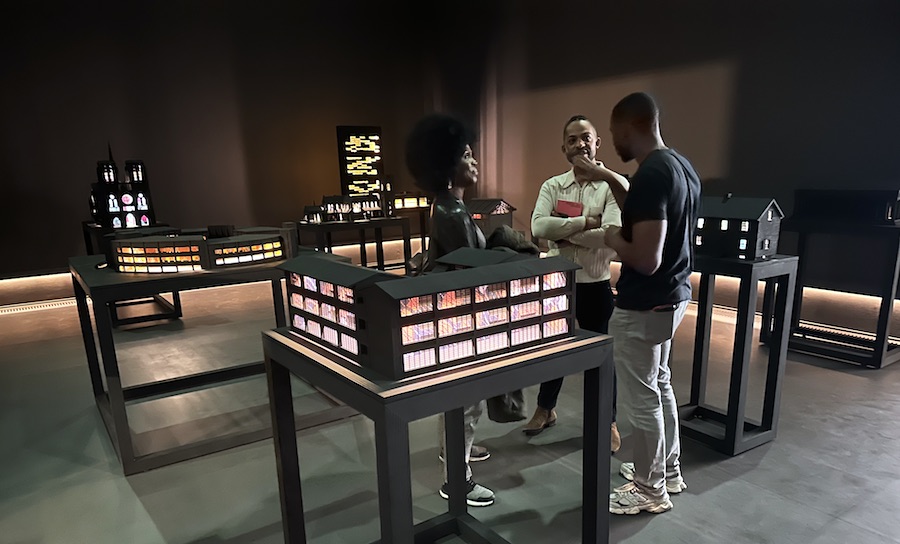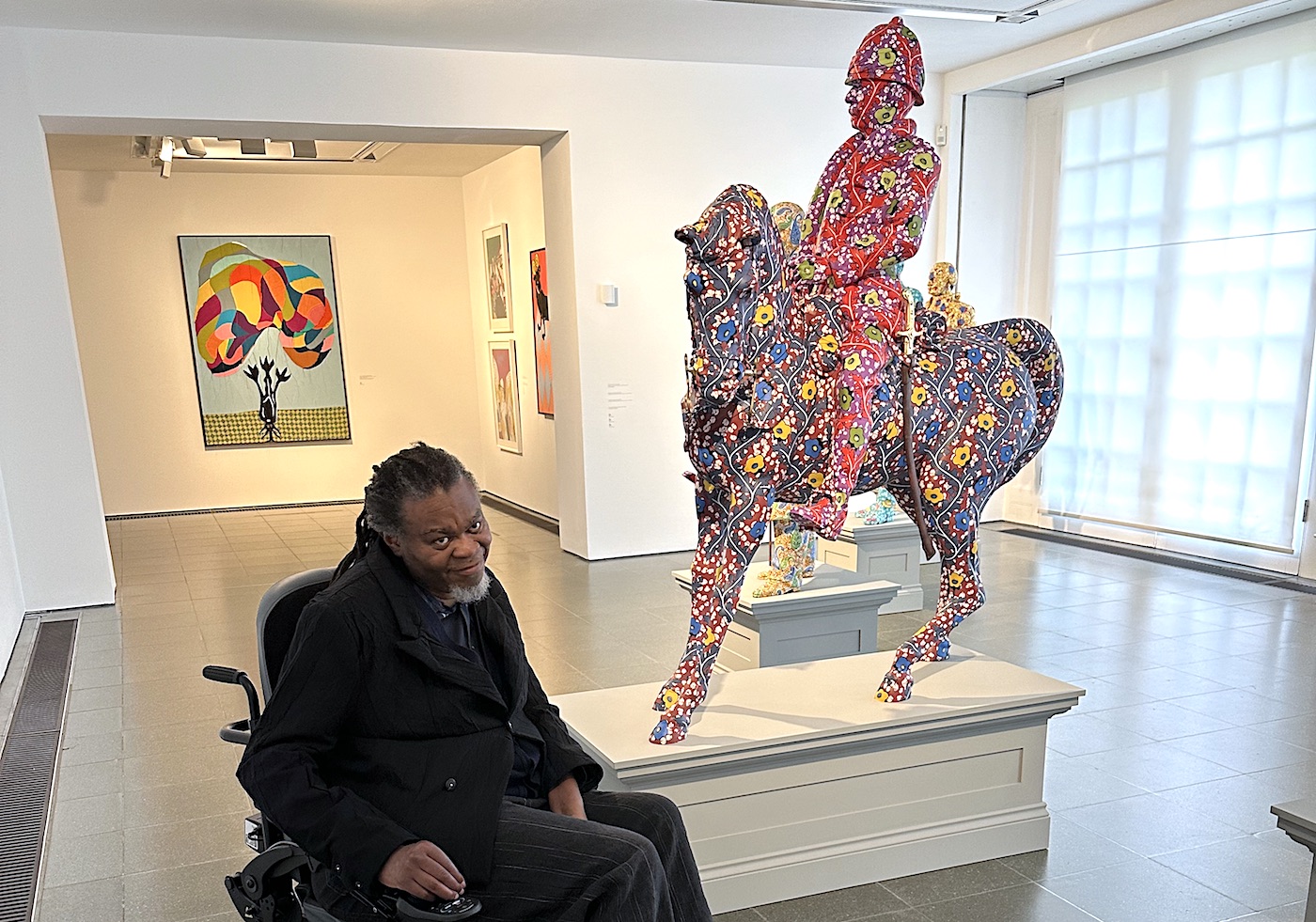Yinka Shonibare Suspended States Serpentine Galleries: When I was a small child – many millennia ago – much of the world map was pink. At school, we were encouraged to believe these far-flung countries were lucky to benefit from our guiding colonial hand. At the end of the Christmas panto, we were expected to stand for the national anthem while our class made collections for Africa’s ‘poor’ children. Slowly, as the iconoclastic irreverence of the swinging 60s and the retro grunge of the 70s spread, it would begin to undermine the class and race hierarchies that, until then, had been the norm in British society, but it was slow going.
A century earlier, Africa had been seen as the unknown continent of Joseph Conrad’s Heart of Darkness. A mysterious, ‘primitive’ land ‘discovered’ by explorers such as David Livingstone and Henry Morton Stanley, Africa provided a psychological counterbalance to the European psyche, creating a notion of a subordinate ‘them’ in relation to the superior ‘us’. We saw ourselves as the bulwark between the ‘civilised’ and the ‘savage’. Museums in Paris, Brussels and London displayed the artefacts of these far-flung societies, displaying what had been plundered but needed a true understanding of their socio-political or religious significance. Many of these objects had a profound effect on modernism and artists such as Picasso. The African mask in Les Demoiselles d’Avignon stood as a trope for all that was chthonic and sexually unfettered, a pictorial embodiment of Freud’s id.

Move on to the 2020s, and the 18-foot bronze statue of Edward Colston, the Bristol-born merchant, philanthropist and trans-Atlantic slave trader, was toppled from its plinth by supporters of Black Lives Matter and flung into Bristol’s harbour. The statue had long divided the city. This, of course, was one way to protest against the injustice and cruelty meted out to those thousands of people trafficked for profit. Still, Yinka Shonibare has, arguably, found a more nuanced, creative and thoughtful way of showcasing these historical injustices.
Born in London in 1962, Shonibare moved to Lagos, Nigeria, at the age of three before returning to study at Byam School of Art and then Goldsmiths. For over 30 years, he has used Western art history and literature to explore contemporary culture and national identities through painting, sculpture, and photography. In 2024, he was nominated for the Turner Prize, and in 2010, his Nelson’s Ship in a Bottle was displayed as part of the series of Fourth Plinth Commissions in Trafalgar Square.
This exhibition, Suspended States at the Serpentine, is his first solo show in 20 years. His subject has not changed, but he has found new ways of interrogating how power systems proliferate and how the legacy and impact of colonialism and imperialism impinge on the contemporary world.

Decolonialised Structures 2022-2023 is an ironic take on the Colston debacle. With wit, panache and originality, Shonibare employs his signature use of Dutch wax print to highlight the complex relationship between European and African cultures. Assembled in the gallery are small-scale replicas of London’s public sculptures. They are so ubiquitous to the city that we probably pass them regularly without noticing them—the general on his horse. Clive of India holding a sword. All are painted in patterns of brightly coloured fabric inspired by Indonesian batik designs, which were mass-produced by the Dutch and then sold to British colonies in West Africa. These well-known figures, including Queen Victoria, Herbert Kitchener and Winston Churchill –built to valorise British colonial power – have been appropriated and ‘decommissioned’ by being submerged under these swirling African patterns.
The darkened central gallery of the Serpentine contains a series of architect’s models, replicas of both historic and contemporary buildings that have universally been seen as places of sanctuary for those fleeing persecution, From Greek and Roman buildings which gave protection to fugitives and enslaved people, to the great European cathedrals, these dark buildings of Sanctuary City are seductively lit from within to reveal brightly patterned walls. Shonibare has explained how he is interested in the way that we ‘think about the sanctuary in relation to homelessness, shelter for women and refugees’, a poignantly topical subject.
One whole gallery has been given over to a work called the War Library. The 5270 books lining the walls are all bound with Dutch wax print cotton. With titles such as the 1989-1992 Afghan Civil War, Romanian Revolution, Suez Crisis and Third Anglo-Maratha War engraved along the spines in gold lettering, they name conflicts and ensuing peace treaties resulting from imperial wars and conflicts. Other books appear with alternative names and in different languages, suggesting how conflict and peace are seen subjectively from very different viewpoints. Some of the spines have deliberately been left blank to suggest that, inevitably, there will be more to come. None of the powerful works in this show speaks so eloquently of the ongoing world conflicts in Gaza and Ukraine with their competing standpoints and narratives.
There are very few artists making political art today, and few who do so with the seductive intelligence of Shonibare. Never didactic, never aggressive, he poses a series of uncomfortable questions about ‘human memory and amnesia’, luring the viewer into a honeyed flytrap of gorgeous pattern and colour only for them to find themselves caught in a complex web of history and morality at a moment in time when xenophobia and nationalism are again on the rise.
Words: Sue Hubbard © Artlyst 2024 Photos © Artlyst 2024
Sue Hubbard is a freelance art critic, award-winning poet and novelist. Her new novel, Flatlands, is out this month from Pushkin Press. It can be ordered here: Flatlands by Sue Hubbard | 9781911590743 | Pushkin Press. Her poems on the life of Gwen John, God’s Little Artist, can be ordered here: God’s Little Artist – Seren (serenbooks.com)

